| Listing 1 - 10 of 13 | << page >> |
Sort by
|

ISBN: 0198149190 9780198149194 Year: 1991 Publisher: Oxford Clarendon
Abstract | Keywords | Export | Availability | Bookmark
 Loading...
Loading...Choose an application
- Reference Manager
- EndNote
- RefWorks (Direct export to RefWorks)
Classical Latin literature --- Epic poetry, Latin --- Aeneas (Legendary character) in literature --- Rome in literature --- History and criticism --- Virgil --- 871 VERGILIUS MARO, PUBLIUS --- -Rome in literature --- Latin epic poetry --- Latin poetry --- 871 VERGILIUS MARO, PUBLIUS Latijnse literatuur--VERGILIUS MARO, PUBLIUS --- Latijnse literatuur--VERGILIUS MARO, PUBLIUS --- Virgilio Marone, P. --- Vergilius Maro, Publius --- Vergilīĭ --- Virgile --- Vergílio --- Wergiliusz --- Vergilīĭ Maron, P. --- Vergilīĭ Maron, Publīĭ --- Verhiliĭ Maron, P. --- Vergil --- Virgilio --- Virgilīĭ --- Virgilius Maro, P. --- Virgilius Maro, Publius --- Virgil Maro, P. --- ווירגיל --- וירגיליוס --- ורגיליוס --- מרו, פובליוס ורגיליוס --- فرجيل --- Pseudo-Virgil --- Pseudo Virgilio --- Virgilio Marón, Publio --- Bhārjila --- Virgilio Marone, P., --- Vergilīĭ, --- Virgile, --- Vergílio, --- Wergiliusz, --- Vergilīĭ Maron, Publīĭ, --- Verhiliĭ Maron, P., --- Vergil, --- Virgilio, --- Virgilīĭ, --- Virgilius Maro, P., --- Virgilius Maro, Publius, --- Virgil Maro, P., --- ווירגיל, --- וירגיליוס, --- ורגיליוס, --- מרו, פובליוס ורגיליוס, --- فرجيل, --- Pseudo-Virgil, --- Pseudo Virgilio, --- Virgilio Marón, Publio, --- Bhārjila, --- Virgil. --- Rome --- In literature. --- Epic poetry, Latin - History and criticism
Book
ISBN: 9780199602681 0199602689 Year: 2013 Publisher: Oxford Oxford university press
Abstract | Keywords | Export | Availability | Bookmark
 Loading...
Loading...Choose an application
- Reference Manager
- EndNote
- RefWorks (Direct export to RefWorks)
Latin fiction --- History and criticism. --- Apuleius. --- Apuleius --- Criticism and interpretation. --- History and criticism --- Apulien --- Apulée --- Apuleius Madaurensis --- Appuleius, Lucius --- Apuleius, Lucius --- Apuleio --- Apuleyo, Lucio --- Abūliyūs, Lūkiyūs --- Apuleius, --- Apuleius Platonicus Madaurensis --- Apuleu --- אפוליאוס --- לוקיוס, אפוליאוס --- ابوليوس --- Appuleius, --- Apuleius Barbarus --- Apulejus, Lucius --- Lucio Apuleio --- Apuleyo de Madauros --- Appuleius
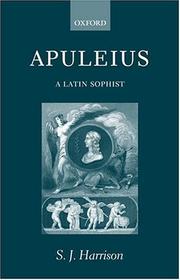
ISBN: 0199271380 1306582423 0191588245 0191036765 9780191588242 9780199271382 0198140533 9780198140535 Year: 2000 Publisher: Oxford
Abstract | Keywords | Export | Availability | Bookmark
 Loading...
Loading...Choose an application
- Reference Manager
- EndNote
- RefWorks (Direct export to RefWorks)
This book is a response to the literary pleasures and scholarly problems of reading the texts of Apuleius, most famous for his novel Metamorphoses or Golden Ass. Living in second-century North Africa, Apuleius was more than an author of fiction; he was a consummate orator and professional intellectual, Platonist philosopher, extraordinary stylist, relentless self-promoter, and versatile author of a remarkably diverse body of work, much of which is lost to us. Thisbook is written for those able to read Apuleius in Latin, and Apuleian works are accordingly quoted without translation (although wh
Apuleius --- Appuleius --- Apuleius Barbarus --- Apulejus, Lucius --- Lucio Apuleio --- Apuleyo de Madauros --- Apulien --- Apulée --- Apuleius Madaurensis --- Appuleius, Lucius --- Apuleius, Lucius --- Apuleio --- Apuleyo, Lucio --- Abūliyūs, Lūkiyūs --- Apuleius, --- Apuleius Platonicus Madaurensis --- Apuleu --- אפוליאוס --- לוקיוס, אפוליאוס --- ابوليوس --- Appuleius, --- Criticism and interpretation.
Book
ISBN: 9786612349089 019157113X 1282349082 9780191571138 9780199233731 019923373X 6612349085 9781282349087 1383036772 Year: 2009 Publisher: Oxford New York Oxford University Press
Abstract | Keywords | Export | Availability | Bookmark
 Loading...
Loading...Choose an application
- Reference Manager
- EndNote
- RefWorks (Direct export to RefWorks)
This collection of essays explores the extensive use of Latin and Greek literary texts in a range of recent poetry written in English. It contains both contributions from poets talking about their uses of classical literature in their own work in lyric poetry and in theatre poetry, and essays from academic experts on the same topics.
English poetry --- American poetry --- New Zealand poetry --- Classical literature --- English literature --- Literature, Classical --- Literature --- Literature, Ancient --- Greek literature --- Latin literature --- New Zealand literature --- American literature --- Classical influences. --- Influence.
Book
ISBN: 0691208492 0691182523 Year: 2020 Publisher: Princeton, New Jersey ; Oxford : Princeton University Press,
Abstract | Keywords | Export | Availability | Bookmark
 Loading...
Loading...Choose an application
- Reference Manager
- EndNote
- RefWorks (Direct export to RefWorks)
"The Roman poet Horace (65-8 BC) has long been read as a wise and pragmatic guide to living a good life. Writing at the very moment when Rome was transitioning from a republic to an empire, Romans found the advice in his poems appealing: live quietly and non-extravagantly amid the excesses of a materialistic society, avoid extreme emotions of any kind as psychologically damaging, place a value on friendship of all kinds, do not be afraid of death, and most famously live every day to the full as tomorrow may never come (carpe diem). But above all else, Horace advocated a life of contentment and self-sufficiency"--
Horace --- Augustinian. --- Augustus. --- Epicurean. --- Horace biography. --- Horace commentary. --- Horace in context. --- Horace poetry selection. --- Horace. --- Horatian. --- Roman lyric poet. --- Stoic. --- annotated Horace poems. --- biographical context. --- commentaries. --- happiness. --- historical context. --- how to be happy. --- how to live. --- ideas. --- interpretations. --- life advice. --- literary criticism. --- meaning of Horace poems. --- meaning of Horace poetry. --- new Horace translation. --- philosophy. --- seize the day. --- selected Horace poems. --- thought.
Book
ISBN: 9780198814061 9780192543783 Year: 2019 Publisher: Oxford : Oxford University Press,
Abstract | Keywords | Export | Availability | Bookmark
 Loading...
Loading...Choose an application
- Reference Manager
- EndNote
- RefWorks (Direct export to RefWorks)
This volume investigates an important and surprisingly widespread phenomenon in Latin literature, which has to date received little sustained discussion: the deliberate assumption of a weaker voice by speakers who in fact hold sufficient status not to be forced into this position. Though often associated with the markers of imperial hegemony and elite speech, Latin literature evinces a remarkably broad range of strategies designed to enable the adoption of a markedly disempowered voice. The series of case studies collected together in Complex Inferiorities cover a wide range of genres, periods, and authors: from topoi such as recusatio (professing a lack of ability to write in status-conforming, superior genres) and rhetorical devices such as prosopopoeia (artfully and strategically adopting a persona to garner favour, even when this means temporarily forfeiting one's higher status and discursive privileges), to the long-silenced female heroines of Ovid's Heroides and satire's irreverent take on the great and the good by framing its narratives as being articulated 'from below'. Even large-scale cultural self-positionings fall within this scope, be they expressions of Roman cultural inferiority vis-à-vis classical Greece or the tensions that arise between humble (yet spiritually superior) Christian writers and their grand, canonical, and classical (yet pagan) predecessors.In demonstrating that re-negotiating alleged weakness constitutes a central activity in Latin literature, this volume reveals the extent of the literary and cultural-political possibilities opened up by assuming and speaking in voices of weakness and inferiority. Authored by experts in their fields, the individual chapters explore the crucial role of the 'weaker voice' in establishing, perpetuating, and challenging hierarchies and values in a wide range of contexts - from poetics and choices of genre, to social status and intra- and intercultural relations - and offer invaluable insights not only for the study of classics, but for literary and cultural studies across the humanities.
Latin literature --- Voice in literature. --- Social status in literature. --- History and criticism. --- History and criticism
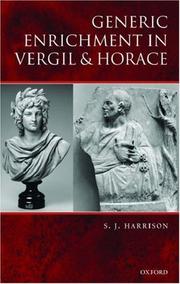
ISBN: 9780199203581 019920358X 0191708178 0199691843 9786611145293 0191525294 1281145297 1435618807 0191615900 Year: 2007 Publisher: Oxford [etc.] Oxford University Press
Abstract | Keywords | Export | Availability | Bookmark
 Loading...
Loading...Choose an application
- Reference Manager
- EndNote
- RefWorks (Direct export to RefWorks)
Literary form. --- Latin poetry --- Epic poetry, Latin --- Genres littéraires --- Poésie latine --- Poésie épique latine --- History and criticism. --- Histoire et critique --- Virgil --- Horace --- Criticism and interpretation. --- Genres littéraires --- Poésie latine --- Poésie épique latine --- Literary form --- Form, Literary --- Forms, Literary --- Forms of literature --- Genre (Literature) --- Genre, Literary --- Genres, Literary --- Genres of literature --- Literary forms --- Literary genetics --- Literary genres --- Literary types (Genres) --- Literature --- History and criticism --- Vergil --- Virgile --- Virgilio Máron, Publio --- Virgilius Maro, Publius --- Vergili Maronis, Publius --- Orazio --- Horacij Flakk, Kvint --- Horatius Flaccus, Quintus --- Vergilius Maro, Publius --- Horatius Flaccus, Q. --- Virgilius Maro, Publius, --- Virgilio Marone, P., --- Vergilīĭ, --- Virgile, --- Vergílio, --- Wergiliusz, --- Vergilīĭ Maron, P. --- Vergilīĭ Maron, Publīĭ, --- Verhiliĭ Maron, P., --- Vergil, --- Virgilio, --- Virgilīĭ, --- Virgilius Maro, P., --- Virgil Maro, P., --- ווירגיל, --- וירגיליוס, --- ורגיליוס, --- מרו, פובליוס ורגיליוס, --- فرجيل, --- Pseudo-Virgil, --- Pseudo Virgilio, --- Virgilio Marón, Publio, --- Bhārjila, --- Vergilius Maro, P. --- Vergilius --- Virgilio Marone, P. --- Vergilīĭ --- Vergílio --- Wergiliusz --- Vergilīĭ Maron, Publīĭ --- Verhiliĭ Maron, P. --- Virgilio --- Virgilius Maro, P. --- Virgil Maro, P. --- Pseudo-Virgil --- Pseudo Virgilio --- Virgilio Marón, Publio --- Bhārjila --- Gorat︠s︡īĭ --- Gorat︠s︡iĭ Flakk, Kvint --- Horacij --- Horacio, --- Horacio Flaco, Q. --- Horacjusz --- Horacjusz Flakkus, Kwintus --- Horacy --- Horaṭiyos --- Horaṭiyus --- Horats --- Horaz --- Khorat︠s︡iĭ --- Khorat︠s︡iĭ Flak, Kvint --- Orazio Flacco, Quinto --- הוראציוס --- הורטיוס --- Marone, Publio Virgilio
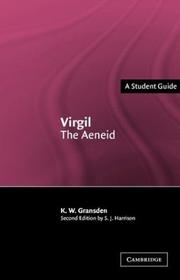
ISBN: 1107148715 1282394649 9786612394645 0511644221 1139165348 0511166060 0511164114 0511566719 0511164912 9780511164118 9780521832137 0521832136 9780521539807 0521539803 9781139165341 9780511166068 0511162510 9780511162510 9780511164910 0521832136 0521539803 9781282394643 6612394641 9780511644221 9780511566714 9781107148710 Year: 2004 Publisher: Cambridge Cambridge University Press
Abstract | Keywords | Export | Availability | Bookmark
 Loading...
Loading...Choose an application
- Reference Manager
- EndNote
- RefWorks (Direct export to RefWorks)
The Aeneid is a landmark of literary narrative and poetic sensibility. This 2004 guide gives a full account of the historical setting and significance of Virgil's epic, and discusses the poet's use of Homer's Iliad and Odyssey, as well as the most celebrated episodes in the poem, including the tragedy of Dido and Aeneas' visit to the underworld. The volume examines Virgil's psychological and philosophical insights, and explains the poem's status as the central classic of European culture. The final chapter considers the Aeneid's influence on later writers including Dante and the Romantics. The guide to further reading has been updated and will prove to be an invaluable resource to students coming to The Aeneid for the first time.
Epic poetry, Latin --- History and criticism. --- Virgil. --- Aeneas --- Αἰνείας --- Aineias --- Enéas --- Эней --- Ėneĭ --- Еней --- Eneja --- Enees --- Eneo --- Énée --- Aeinéas --- Enea --- Enejs --- Enėjas --- Aineiasz --- アイネイアース --- Aineiāsu --- Eneasz --- Ajnejas --- Eneias --- Енеја --- Aeneis --- 埃涅阿斯 --- Ainieasi --- In literature. --- Rome --- Aeneas (Legendary character) in literature. --- Arts and Humanities --- History --- Aeneas (Legendary character)--in literature.
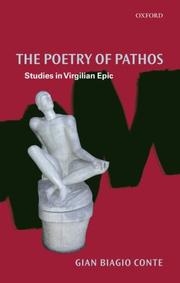
ISBN: 9780199287017 0199287015 0191713260 9786611154455 1281154458 019153689X Year: 2007 Publisher: Oxford [etc.] Oxford University Press
Abstract | Keywords | Export | Availability | Bookmark
 Loading...
Loading...Choose an application
- Reference Manager
- EndNote
- RefWorks (Direct export to RefWorks)
Virgil. --- Virgil --- Criticism and interpretation. --- Vergil --- Virgile --- Virgilio Máron, Publio --- Virgilius Maro, Publius --- Vergili Maronis, Publius --- Vergilius Maro, Publius --- Virgilius Maro, Publius, --- Virgilio Marone, P., --- Vergilīĭ, --- Virgile, --- Vergílio, --- Wergiliusz, --- Vergilīĭ Maron, P. --- Vergilīĭ Maron, Publīĭ, --- Verhiliĭ Maron, P., --- Vergil, --- Virgilio, --- Virgilīĭ, --- Virgilius Maro, P., --- Virgil Maro, P., --- ווירגיל, --- וירגיליוס, --- ורגיליוס, --- מרו, פובליוס ורגיליוס, --- فرجيل, --- Pseudo-Virgil, --- Pseudo Virgilio, --- Virgilio Marón, Publio, --- Bhārjila, --- Vergilius Maro, P. --- Vergilius --- Virgilio Marone, P. --- Vergilīĭ --- Vergílio --- Wergiliusz --- Vergilīĭ Maron, Publīĭ --- Verhiliĭ Maron, P. --- Virgilio --- Virgilius Maro, P. --- Virgil Maro, P. --- Pseudo-Virgil --- Pseudo Virgilio --- Virgilio Marón, Publio --- Bhārjila --- Marone, Publio Virgilio
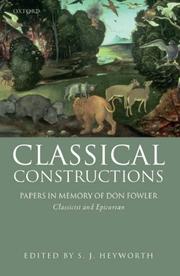
ISBN: 9780199218035 019921803X 0191711535 9786611145415 1281145416 0191527254 Year: 2007 Publisher: Oxford [etc.] Oxford University Press
Abstract | Keywords | Export | Availability | Bookmark
 Loading...
Loading...Choose an application
- Reference Manager
- EndNote
- RefWorks (Direct export to RefWorks)
Classical literature --- Classical philology. --- History and criticism. --- Fowler, Don,
| Listing 1 - 10 of 13 | << page >> |
Sort by
|

 Search
Search Feedback
Feedback About UniCat
About UniCat  Help
Help News
News